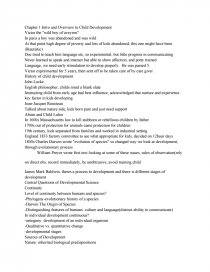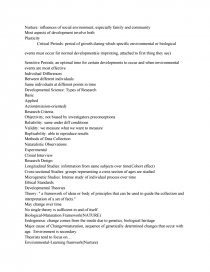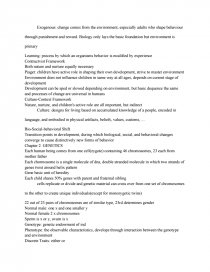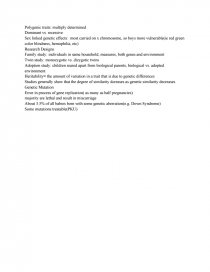Mr
Essay by review • December 11, 2010 • Study Guide • 834 Words (4 Pages) • 915 Views
Chapter 1 Intro and Overview to Child Development
Victor the "wild boy of aveyron"
In paris a boy was abandoned and was wild
At that point high degree of poverty and lots of kids abandoned, this one might have been ill(autistic)
Doc tried to teach him language etc, so experimental, but little progress in communicating
Never learned to speak and interact but able to show affection, and potty trained
Language, we need early stimulation to develop properly. He was passed 5
Victor experimental for 5 years, then sent off to be taken care of by care giver
History of child development
John Locke
English philosopher, childs mind a blank slate
Instructing child from early age had best influence, acknowledged that nurture and experience key factor in kids developing
Jean-Jacques Rousseau
Talked about nature side, kids born pure and just need support
Abuse and Child Labor
In 1600s Massachusetts law to kill stubborn or rebellious children by father
1700s out of protection for animals came protection for children
19th century, kids separated from families and worked in industrial setting
England 1833 factory committee to see what appropriate for kids, decided on 12hour days
1800s Charles Darwin wrote "evolution of species" so changed way we look at development, through evolutionary process
William Preyer wrote first text looking at some of these issues, rules of observation(rely on direct obs, record immediately, be unobtrusive, avoid training child
James Mark Baldwin, theres a process to development and there is different stages of development
Central Questions of Developmental Science
Continuity
Level of continuity between humans and species?
-Phylogeny-evolutionary history of a species
-Darwin The Origin of Species
-Distinguishing features of humans: culture and language(distinct ability to communicate)
In individual development continuous?
-ontogeny: development of an individual organism
-Qualitative vs. quantitative change
-developmental stages
Sources of Development
Nature: inherited biological predispositions
Nurture: influences of social environment, especially family and community
Most aspects of development involve both
Plasticity
Critical Periods: period of growth during which specific environmental or biological events must occur for normal development(ie imprinting, attached to first thing they see)
Sensitive Periods; an optimal time for certain developments to occur and when environmental events are most effective
Individual Differences
Between different individuals
Same individuals at different points in time
Developmental Science: Types of Research
Basic
Applied
Action(mission-oriented)
Research Criteria
Objectivity; not biased by investigators preconceptions
Reliability: same under diff conditions
Validity: we measure what we want to measure
Replicability: able to reproduce results
Methods of Data Collection
Naturalistic Observations
Experimental
Clinial Interview
Research Design
Longitudinal Studies: information from same subjects over time(Cohort effect)
Cross-sectional Studies: groups representing a cross section of ages are studied
Microgenetic Studies: Intense study of individual process over time
Ethical Standards
Developmental Theories
Theory: " a framework of ideas or body of principles that can be used to guide the collection and interpretation of a set of facts."
May change over time
No single theory is sufficient in and of itself
Biological-Maturation Framework(NATURE)
Endogenous: change comes from the inside due to genetics, biological heritage
Major cause of Change=maturation, sequence of genetically determined changes that occur with age. Environment is secondary.
Theorists tend to focus on....
Environmental-Learning framwork(Nurture)
Exogenous:
...
...



